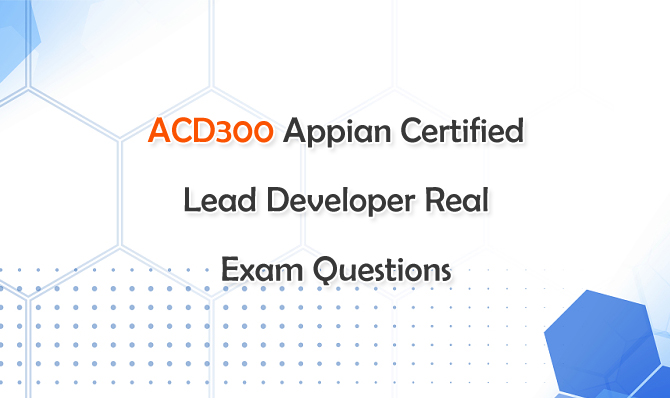Appian Certified Lead Developer ACD300 exam is designed to validate the expertise of individuals in leading Appian project teams to success. To be eligible for the ACD300 exam, candidates must possess the Associate and Senior Developer certifications. The Appian Certified Lead Developer ACD300 exam consists of 35 items, and participants are given 90 minutes to demonstrate their proficiency. The cost of the exam is $200, with a cut score of 65% required to pass.

An Appian Certified Lead Developer plays a pivotal role in the successful delivery of Appian projects, leveraging their one to three years of experience in the field. Their expertise spans the entire spectrum of Appian's capabilities, from Business Process Management (BPM) and Customer Relationship Management (CRM) to Enterprise Resource Management (ERP) strategies. These developers exhibit a profound understanding of Appian's platform architecture and adeptly use it to design and implement transformative solutions.
Guiding Technical Design: Lead Developers provide guidance on technical design requirements, ensuring adherence to development and database best practices.
Solution Architecture Decisions: They make critical solution architecture decisions based on operability, performance, scalability, maintainability, and usability, communicating the benefits and risks effectively to clients.
Comprehensive Database Knowledge: Lead Developers possess a holistic understanding of relational databases and hands-on experience in implementing advanced Appian components and configurations.
Extending Appian's Capabilities: They extend Appian's functionality by developing advanced integrations, programming web APIs, and strategizing advanced document generation.
Project and Resource Management: Lead Developers manage resources within a client's internal team, collaborating with database administrators, DevOps, quality assurance, and more throughout the project lifecycle.
The ACD300 exam covers a range of topics, each with its relative weight in the exam. Candidates should focus their preparation on these key areas:
Platform Management (19%): Scaling applications, executing deployments, recommending strategies, and managing user authentication and authorization.
Multiple-Application Best Practices (16%): Evaluating and designing applications for consistency and reusability, parallel development best practices, and understanding enterprise architecture.
Advanced Relational Databases (14%): Analyzing and evaluating database schemas, migrating data, and implementing advanced database features.
Application Load and Concurrency (16%): Monitoring and troubleshooting application-based issues, designing data management strategies, and performing load testing.
Extending Appian (18%): Designing and troubleshooting advanced integrations, programming web APIs, strategizing document generation, and understanding authentication mechanisms.
Project and Resource Management (17%): Interpreting client requirements, recommending technical design options, coordinating and leading activities across multiple teams, and ensuring Appian governance.